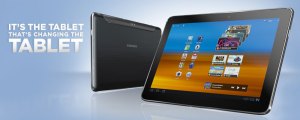Tablets
I thought that it would be a good idea to have a brief discussion about Tablets and my personal preference.
As most people would realise there are a number of tablets that are out on the market at the moment. Tablets are the new technology fashion accessory alongside mobile phones. The success and the sudden rise in the tablet arena has been caused primarily by the Apple iPad release.
Looking back through the years we can see lots of very similar solutions, most of which did not take off. Microsoft have released various incarnations of their Windows Operating System with tweaks or add-on components designed for tablet-type computing. Most of the reasons for the failure of such devices was either due to the hardware being unable to support the functionality of the software or the combination of the hardware and software not being married correctly. The only real notable success in this arena (before Apple got involved) was the Compaq iPaq.
So, back to the here and now… tablets are here and are likely to stay but which one is the one that I would go and spend my hard earned money on?
The contenders fall into two categories, Apple and Android… there are other options out there but realistically I don’t think that I would go through and purchase another solution.
Apple iPad 2
The Apple iPad 2 is a very nice piece of kit. It is slick and thin, the OS is responsive and has massive support with applications. Typing on the onscreen keyboard is also slick. My concerns with the device is over the icon size on the screen (the icons always seem so large) and the lack of expandability… you do have to try and think about the capacity that you will require 6 months down the line. I’m planning to use this as a work device and therefore support for Proxy settings on wireless networks is required and also the advantage of having a Cisco based VPN client is also good.
Samsung Galaxy Tab 10.1

The Samsung Galaxy Tab 10.1 (please note that this is the thinner 10.1 and not the 10.1v) is a beautiful piece of kit. It was definitely designed in response to the Apple iPad 2, taking a look at the original 10.1 which has now been renamed to be 10.1v and released by Vodafone, it was designed to compete with the original Apple iPad unfortunately a little too late. Part of this delay was caused by a late release of the Android platform designed for Tablets. The new thinner 10.1 tab is sexier and thinner than the Apple iPad 2. The Android 3 operating system is almost as slick as iOS and Android is gaining some serious applications and is a real contender to Apples throne. Annoyingly there is still a lack of easy native configuration of Proxy settings on the device but Samsung did create their own add-on software on the original Galaxy Tab which helped with this. I am not aware of a Cisco VPN client for Android at the moment but I may be wrong about this. There is a lack of a memory card slot in the device and therefore planning in advance is required again. Unfortunately, at the time of writing, this device has not actually been released in the UK.
Asus Eee Pad Transformer
The Asus Eee Pad Transformer (TF101) just about has all of the items that I am looking for in a device. It is a tablet and can also be purchased with a keyboard attachment that also has another battery to extend the life of the tablet. This gives you the best of both worlds, a tablet to match an iPad when travelling light plus a conversion to a full laptop if you are writing lots of documents etc.
The Asus runs Android 3 and therefore the OS is as slick as the Samsung device. Another advantage of the Asus is the MicroSD card slot that is included in the device, this gives you the opportunity to add more storage to the system, if required. This device is available in the UK now, has quite a nice brown colour to the device and is competitively priced against the iPad but includes a keyboard.
For me I believe that I can look past the Proxy and VPN features for a device that will be more useful to me… I know that the apps to provide the other functionality will come in time (usually not too long). Android has long been known as an OS that can be customised, and I like to tweak and customise devices like this. The added advantage for me with the Asus is the keyboard element, this gives me an extended battery life (up to 16 hours) and is ideally suited for if I travel. I’m looking to make my purchase over the next couple of weeks and therefore I’ll try to post up a full review of the device after that.


